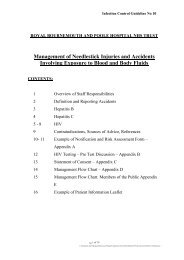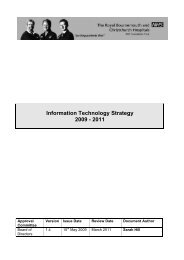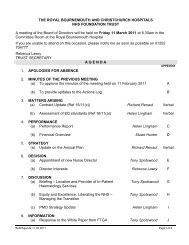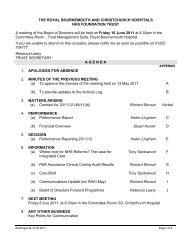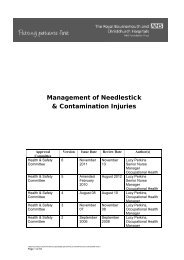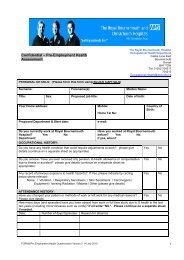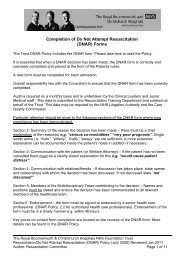A G E N D A 1. APOLOGIES FOR ABSENCE Ian Metcalfe 2 ...
A G E N D A 1. APOLOGIES FOR ABSENCE Ian Metcalfe 2 ...
A G E N D A 1. APOLOGIES FOR ABSENCE Ian Metcalfe 2 ...
Create successful ePaper yourself
Turn your PDF publications into a flip-book with our unique Google optimized e-Paper software.
We also recognise that the actions we take may be costly for other organisations in the healthcare sector. So we intend to consider the impact of our possible actions on providers, and otherparties, and will pay close attention to whether the burden they would impose is in proportion tothe scale of the problem they aim to correct.Deciding whether to take formal or informal actionWhen called on to act, Monitor may need to choose between taking informal action, formal action,or no action at all. We may also consider responding to a problem in ways that do not involve theuse of our enforcement powers. For example, we may decide to review the situation, review ourown policy approach, or consider addressing the matter by using other powers such as the powerto set prices for some NHS services.Even when a matter could appropriately be addressed by using Monitor’s formal enforcementpowers, it may still be appropriate to deal with it informally and give providers an opportunity toaddress any issues without a formal investigation. Monitor’s decision on whether to take formal orinformal action will take into account the individual circumstances of the matter in hand. We willmake our decisions based on what is in the interests of health care service users in line with ourmain duty. Relevant considerations may include:the impact of the breach or potential breach on health care service users;whether the provider has already taken steps that suggest the breach is unlikely to recur,for example by:oonotifying the breach to Monitor as soon as it was identified; orvoluntarily taking action to end the breach and limit the risk of similar futurebreaches;the context in which the breach has occurred. For example, we might consider: whetherthe conduct involves repeated breaches of the same condition; a provider that isrepeatedly breaching different conditions; whether other regulators or relevantstakeholders have relevant concerns about the provider; a provider’s history of respondingto breaches; the likelihood that the action being considered resulting in compliance andthe speed at which it will result in compliance; whether the type of breach is thought to bewidespread in the health care sector; and/ orwhether any third parties (e.g. other regulators or litigants) are taking relevant action inrelation to the same breach.Page 15 of 50



